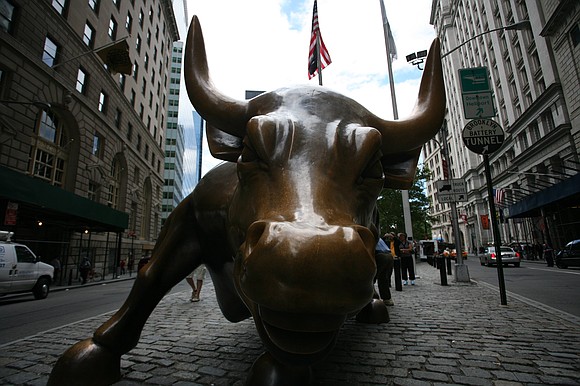The bull market turns 10 years old
CNN/Stylemagazine.com Newswire | 3/11/2019, 12:18 p.m.
By Matt Egan, CNN Business
(CNN) -- The longest bull market in American history was dealt a scary brush with death late last year. But it survived, narrowly, and it's now been alive for a decade.
The market upswing, born out of the ashes of the Great Recession, turned 10 years old on Saturday.
The S&P 500 has more than quadrupled from its devil's bottom of 666 in March 2009. The Dow has spiked nearly 19,000 points, or almost 300%. And the Nasdaq has skyrocketed just under 500%.
The remarkable bull market reflects the slow-but-steady recovery in the economy, record corporate profits and ridiculously easy money from global central bankers. Extremely low interest rates and massive central bank balance sheets left investors hoping to generate decent returns with little choice but to gamble on risky stocks.
The 10th birthday of the bull market brings about an obvious question: If it's already the oldest in history, how much longer can it last? But the adage is that bull markets and economic expansions don't die of old age.
"Bull markets don't have expiration dates," said Scott Clemons, chief investment strategist at Brown Brothers Harriman. "A bull market usually comes to an end when financial excesses go to extremes, and we don't see that anywhere right now."
The market anniversary deserves a bit of an asterisk. That's because the S&P 500 hasn't closed at a record high since September. If the broad index closes in a bear market prior to hitting a new high, history will say the bull market officially ended last fall.
In other words, it would have spanned just under a decade.
It's also worth noting that while the bull market is the longest on record, it's not the strongest. That title goes to the 1990s bull market, which lifted the S&P by 417% at its peak, according to LPL Financial.
The market mayhem of late 2018 served as a blunt reminder: The bull market won't last forever. In fact, the Dow and S&P 500 nearly closed last December in a bear market, defined as a 20% decline from prior highs. And the Nasdaq did officially enter a bear market as Wall Street freaked out about an imminent recession.
Easy money is still here
US stocks have raced back to life in 2019.
Recession fears have eased, thanks to progress in US-China trade talks and a sharp reversal from the Federal Reserve, which is no longer rushing to raise interest rates. Despite this week week's selloff, the S&P 500 is less than 8% away from its all-time high.
David Kelly, chief global strategist at JPMorgan Funds, doesn't think the bull market is near its demise.
"The bull market should continue until the economy actually goes into recession," Kelly said. "The only thing that will keep it down is if people are truly scared about the economy."
The stock market is once again being aided by global central bankers. Not only is the Fed on pause and considering an end to its balance sheet winddown, but the uber dovish European Central Bank is backing off plans to hike interest rates. The ECB said this week that it expects rates to remain at record lows -- in negative territory -- through the end of 2019.
"Interest rates are so low that stocks look attractive," Kelly said. "It's going to be very hard to see a sustained slump until people become really worried about the profit outlook."
Growth decelerates sharply
Slowdown fears were brought back to the forefront this week by the latest economic numbers. China's exports plunged 21% in February, the most severe decline in three years.
And the United States created just 20,000 jobs in February, far shy of the 160,000 that economists had predicted. It was the biggest jobs miss relative to expectations since December 2008, according to Bespoke Investment Group.
But economists argue it's too early to get worried about a single poor month of employment gains. January's jobs report was a blockbuster, with nonfarm payrolls surging by 304,000 jobs. And February's poor report was likely muddied by bad weather and the lingering impact of the government shutdown.
The jobs report "was the strangest I've seen in some time," Clemons said. "Clearly the government shutdown and winter weather played havoc with the figures."
Clemons said it makes sense to wait and see whether the jobs market rebounds in March. He expects that it will.
Still, the overall economic trend isn't pretty. The US economy grew at a robust pace of 3.4% annually in the third quarter, but GDP slowed to 2.6% in the fourth quarter.
And the Atlanta Federal Reserve's GDPNow forecasting tool is calling for first-quarter growth of just 0.5%.
"This economy is probably just decelerating rather than stalling," said Kelly.
If he's wrong, the bull market might not live for 10 years after all.







